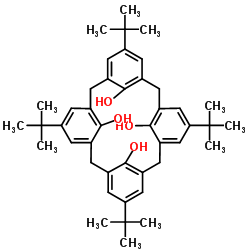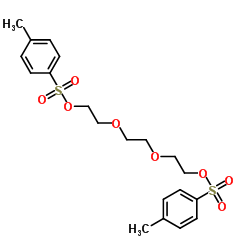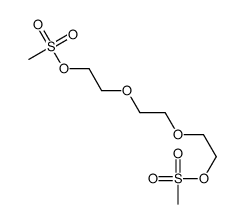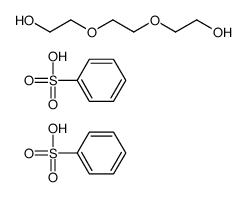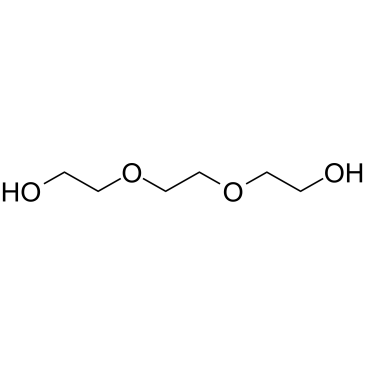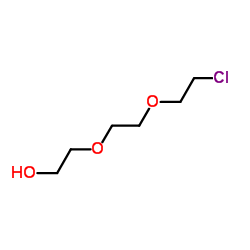171058-95-0
| 中文名 | 4-叔丁基杯[4]芳烃-冠-4-复合体 |
|---|---|
| 英文名 | 4-tert-butyl-calix[4]arene-crown-4-complex |
| 中文别名 | 4-叔丁基杯[4]芳烃-冠醚-4-复合物 |
| 英文别名 |
4-TERT-BUTYLCALIX(4)-CROWN-4
5,11,17,23-Tetrakis(1,1-dimethyl)-25,26-dihydroxy-27,28-crown-4-calix[4]arene 25,27-(3,6-dioxaocta-1,8-diyl)oxy-26,28-dihydroxy-5,11,17,23-tetra-tert-butyl-calix[4]arene 5,11,17,23-Tetrakis(1,1-dimethylethyl)-25,27-(crown-4)-26,28-dihydroxycalix[4]arene p-t-butylcalix[4]crown-4 MFCD02093902 p-tert-butylcalix[4]crown-4 |
| 密度 | 1.069g/cm3 |
|---|---|
| 沸点 | 766.4ºC at 760 mmHg |
| 分子式 | C40H48O4 |
| 分子量 | 592.80700 |
| 闪点 | 417.3ºC |
| 精确质量 | 592.35500 |
| PSA | 36.92000 |
| LogP | 7.72710 |
| 蒸汽压 | 2.48E-24mmHg at 25°C |
| 折射率 | 1.548 |
| 储存条件 | 密闭于阴凉干燥环境中 |
| 稳定性 | 遵照规定使用和储存则不会分解。 |
| 分子结构 | 1、摩尔折射率:无可用 2、 摩尔体积(cm3/mol):无可用 3、 等张比容(90.2K):无可用 4、 表面张力(dyne/cm):无可用 5、 极化率:无可用 |
| 计算化学 | 1、 疏水参数计算参考值(XlogP):13.1 2、 氢键供体数量:2 3、 氢键受体数量:6 4、 可旋转化学键数量:4 5、 拓扑分子极性表面积(TPSA):77.4 6、 重原子数量:56 7、 表面电荷:0 8、 复杂度:1080 9、 同位素原子数量:0 10、 确定原子立构中心数量:0 11、 不确定原子立构中心数量:0 12、 确定化学键立构中心数量:0 13、 不确定化学键立构中心数量:0 14、 共价键单元数量:1 |
| 更多 | 1. 性状:白色结晶性粉末 2. 密度(g/mL,25/4℃):无可用 3. 相对蒸汽密度(g/mL,空气=1):无可用 4. 熔点(ºC):无可用 5. 沸点(ºC,常压):无可用 6. 沸点(ºC,5.2kPa):无可用 7. 折射率:无可用 8. 闪点(ºC):无可用 9. 比旋光度(º):无可用 10. 自燃点或引燃温度(ºC):无可用 11. 蒸气压(kPa,25ºC):无可用 12. 饱和蒸气压(kPa,60ºC):无可用 13. 燃烧热(KJ/mol):无可用 14. 临界温度(ºC):无可用 15. 临界压力(KPa):无可用 16. 油水(辛醇/水)分配系数的对数值:无可用 17. 爆炸上限(%,V/V):无可用 18. 爆炸下限(%,V/V):无可用 19. 溶解性:无可用 |
Synonym:None Known Section 2 - COMPOSITION, INFORMATION ON INGREDIENTS
Risk Phrases: 36/37/38 Section 3 - HAZARDS IDENTIFICATION EMERGENCY OVERVIEW
Irritating to eyes, respiratory system and skin. Potential Health Effects Eye: Causes eye irritation. May cause chemical conjunctivitis. Skin: Causes skin irritation. Ingestion: May cause gastrointestinal irritation with nausea, vomiting and diarrhea. Inhalation: Causes respiratory tract irritation. Can produce delayed pulmonary edema. Chronic: Effects may be delayed. Section 4 - FIRST AID MEASURES Eyes: Immediately flush eyes with plenty of water for at least 15 minutes, occasionally lifting the upper and lower eyelids. Get medical aid. Skin: Get medical aid. Flush skin with plenty of water for at least 15 minutes while removing contaminated clothing and shoes. Wash clothing before reuse. Ingestion: Never give anything by mouth to an unconscious person. Get medical aid. Do NOT induce vomiting. If conscious and alert, rinse mouth and drink 2-4 cupfuls of milk or water. Inhalation: Remove from exposure and move to fresh air immediately. If not breathing, give artificial respiration. If breathing is difficult, give oxygen. Get medical aid. Do NOT use mouth-to-mouth resuscitation. Notes to Physician: Treat symptomatically and supportively. Section 5 - FIRE FIGHTING MEASURES General Information: As in any fire, wear a self-contained breathing apparatus in pressure-demand, MSHA/NIOSH (approved or equivalent), and full protective gear. During a fire, irritating and highly toxic gases may be generated by thermal decomposition or combustion. Runoff from fire control or dilution water may cause pollution. Extinguishing Media: In case of fire, use water, dry chemical, chemical foam, or alcohol-resistant foam. Use water spray, dry chemical, carbon dioxide, or appropriate foam. Section 6 - ACCIDENTAL RELEASE MEASURES General Information: Use proper personal protective equipment as indicated in Section 8. Spills/Leaks: Vacuum or sweep up material and place into a suitable disposal container. Clean up spills immediately, observing precautions in the Protective Equipment section. Avoid generating dusty conditions. Provide ventilation. Section 7 - HANDLING and STORAGE Handling: Minimize dust generation and accumulation. Avoid contact with eyes, skin, and clothing. Keep container tightly closed. Avoid ingestion and inhalation. Use with adequate ventilation. Wash clothing before reuse. Storage: Store in a tightly closed container. Store in a cool, dry, well-ventilated area away from incompatible substances. Section 8 - EXPOSURE CONTROLS, PERSONAL PROTECTION Engineering Controls: Facilities storing or utilizing this material should be equipped with an eyewash facility and a safety shower. Use adequate ventilation to keep airborne concentrations low. Exposure Limits CAS# 171058-95-0: Personal Protective Equipment Eyes: Wear appropriate protective eyeglasses or chemical safety goggles as described by OSHA's eye and face protection regulations in 29 CFR 1910.133 or European Standard EN166. Skin: Wear appropriate protective gloves to prevent skin exposure. Clothing: Wear appropriate protective clothing to prevent skin exposure. Respirators: A respiratory protection program that meets OSHA's 29 CFR 1910.134 and ANSI Z88.2 requirements or European Standard EN 149 must be followed whenever workplace conditions warrant respirator use. Section 9 - PHYSICAL AND CHEMICAL PROPERTIES Physical State: Crystalline powder Color: fine - white to almost white Odor: Not available. pH: Not available. Vapor Pressure: Not available. Viscosity: Not available. Boiling Point: Not available. Freezing/Melting Point: Not available. Autoignition Temperature: Not available. Flash Point: Not available. Explosion Limits, lower: Not available. Explosion Limits, upper: Not available. Decomposition Temperature: Solubility in water: Not available. Specific Gravity/Density: Molecular Formula: C50H66O6 Molecular Weight: 762.4584 Section 10 - STABILITY AND REACTIVITY Chemical Stability: Stable under normal temperatures and pressures. Conditions to Avoid: Incompatible materials, dust generation, excess heat, strong oxidants. Incompatibilities with Other Materials: Oxidizing agents. Hazardous Decomposition Products: Carbon monoxide, irritating and toxic fumes and gases, carbon dioxide. Hazardous Polymerization: Has not been reported Section 11 - TOXICOLOGICAL INFORMATION RTECS#: CAS# 171058-95-0 unlisted. LD50/LC50: Not available. Carcinogenicity: 4-Tert.-Butyl-Calix[4]arene-Crown-4-Complex - Not listed by ACGIH, IARC, or NTP. Section 12 - ECOLOGICAL INFORMATION Section 13 - DISPOSAL CONSIDERATIONS Dispose of in a manner consistent with federal, state, and local regulations. Section 14 - TRANSPORT INFORMATION IATA No information available. IMO No information available. RID/ADR No information available. Section 15 - REGULATORY INFORMATION European/International Regulations European Labeling in Accordance with EC Directives Hazard Symbols: XI Risk Phrases: R 36/37/38 Irritating to eyes, respiratory system and skin. Safety Phrases: WGK (Water Danger/Protection) CAS# 171058-95-0: No information available. Canada None of the chemicals in this product are listed on the DSL/NDSL list. CAS# 171058-95-0 is not listed on Canada's Ingredient Disclosure List. US FEDERAL TSCA CAS# 171058-95-0 is not listed on the TSCA inventory. It is for research and development use only. SECTION 16 - ADDITIONAL INFORMATION N/A |
|
生态学数据: 该物质对环境可能有危害,对水体应给予特别注意。
|
| 危害码 (欧洲) | Xi |
|---|---|
| 风险声明 (欧洲) | R36/37/38 |
| 安全声明 (欧洲) | S26-S37-S39 |
|
~53% 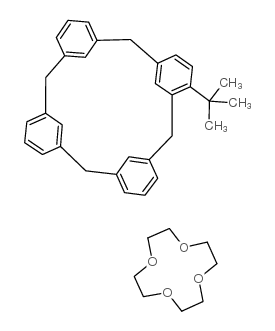
171058-95-0 |
| 文献:Chawla, Har Mohindra; Hundal, Geeta; Kumar; Singh, Parminder Journal of Inclusion Phenomena and Macrocyclic Chemistry, 2012 , vol. 72, # 3-4 p. 323 - 330 |
|
~56% 
171058-95-0 |
| 文献:Gruen, Alajos; Koszegi, Eva; Bitter, Istvan Tetrahedron, 2004 , vol. 60, # 23 p. 5041 - 5048 |
|
~68% 
171058-95-0 |
| 文献:Alekseeva, Elena A.; Basok, Stepan S.; Mazepa, Alexander V.; Gren, Andrei I. Mendeleev Communications, 2007 , vol. 17, # 6 p. 330 - 331 |
|
~71% 
171058-95-0 |
| 文献:Alekseeva, Elena A.; Basok, Stepan S.; Mazepa, Alexander V.; Gren, Andrei I. Mendeleev Communications, 2007 , vol. 17, # 6 p. 330 - 331 |
|
~% 
171058-95-0 |
| 文献:Csokai, Viktor; Gruen, Alajos; Bitter, Istvan Tetrahedron Letters, 2003 , vol. 44, # 25 p. 4681 - 4684 |
|
~% 
171058-95-0 |
| 文献:Gruen, Alajos; Koszegi, Eva; Bitter, Istvan Tetrahedron, 2004 , vol. 60, # 23 p. 5041 - 5048 |
|
~% 
171058-95-0 |
| 文献:Gruen, Alajos; Koszegi, Eva; Bitter, Istvan Tetrahedron, 2004 , vol. 60, # 23 p. 5041 - 5048 |

